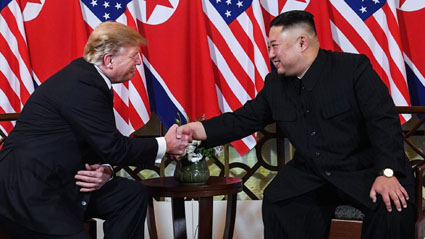Special to WorldTribune.com
 By Donald Kirk
By Donald Kirk
HANOI – Call the outcome of the second Trump-Kim summit disappointing or frustrating, but it was anything but a “failure.”
The real failure would have been President Donald Trump’s signature authorizing concessions in return for promises made only to be broken. The North’s nuclear program is buried so deeply in the mindset of the Kim family dynasty that he’s absolutely not going to surrender it under the guise of any agreement.
“Trump avoided fake denuclearization,” Kim Tae-Woo, retired director of the Korea Institute of National Unification, told me. “We really worried about a bad small deal. We were afraid North Korea would enjoy lifting of sanctions and maintenance of all facilities.”

Or, if the summit could indeed be called a failure, then U.S. negotiators should have known what was coming. “The dispute that led to the breakup could have been managed at the working level,” in the view of Victor Cha, who served on the national security council during the George W. Bush presidency. Trump “should have empowered his negotiators to make more progress before meeting.”
They might not have gotten anywhere either, but Moon Jae-In, elected president nearly two years ago as the liberal darling after nearly a decade of conservative rule, now risks a backlash that endangers his presidency.
Moon’s embarrassment was obvious on March 1, the centennial of a short-lived bloody revolt against Japanese colonial rule, when he had to revise a speech that he had assumed would be a great time for touting the results of the summit.
Moon “had a tough day,” said Lee Sung-yoon, a faculty member at the Fletcher School of Diplomacy at Tufts University. “Crestfallen,” was Lee’s word for Moon’s immediate response. He “had planned for a major self-celebration featuring odes to himself” on “denuclearization of the Korean peninsula,” “inter-Korean reconciliation,” and “Korean independence” while his fans proclaimed “Chairman Kim is the greatest” and chanted, “Yankee go home.”
Now Moon, sensitive to conservative power in a society accustomed to the protection of the U.S.-Korean alliance, has to be careful about maintaining decent relations with the U.S. while leftists keep up demands for U.S. forces to leave.
“North Korea goes on trying to drive a wedge between allies,” said Kim Tae-Woo. “We know that their eventual goal is the destruction of the alliance while many are angry and very much resentful” about Kim’s reluctance to compromise.”
In fact, three days after the breakdown of the Trump-Kim summit, U.S. and South Korean defense officials announced a scaled-down joint military exercise with battalion-sized units attacking imaginary enemy forces. Called “Dong Maeng,” “alliance,” the exercise replaces much larger war games that Trump halted after his summit with Kim in Singapore last June.
Trump after his summit here signaled his desire to scale down this year’s war games when he remarked that a single large-scale exercise cost $100 million and South Korea should be picking up more of the expense. Regardless, Gen. Robert B. Abrams, commander of U.S. forces in Korea, and Gen. Park Han-Ki, chairman of South Korea’s joint chiefs, in a joint statement said such exercises were “crucial in sustaining and strengthening the alliance.”
This emphasis on military strength doesn’t mean the end of approaches to the North by the U.S. as well as South Korea.
Thae Yong-Ho, the former minister at the North Korean embassy in London, who defected to South Korea nearly three years ago, thinks the Americans should talk directly to “the North Korean people.” More and more North Koreans, he argued while the summit was going on, need to learn about a better life in the South from tuning in secretly to South Korean TV and hearing from North Korean defectors.
If that seems far-fetched, so does the prospect of Kim ordering a nuclear strike. The greatest value of nuclear warheads is their use as a bargaining tool, but why worry about denuclearization? Kim is no longer wielding the nuclear threat while nursing hopes for concessions in lower level talks.
On that note, the break-up of the Hanoi summit, bereft of any “Hanoi Declaration,” as the Vietnamese host had proudly anticipated, should close an era of summitry. Trump would appear too preoccupied with issues at home while Kim may not be at all interested in accepting Moon’s repeated invitation to come to Seoul in return for hosting him in Pyongyang in September.
“There won’t be any more summit talks,” said Shim Jae-Hoon, former Seoul bureau chief for the old “Far Eastern Economic Review.” “Kim is too busy finding money to feed his people. Trump is too busy fighting waves coming to destroy him.” That leaves it up to the two Koreas to try and sort things out in a process that’s likely to go on for years.
